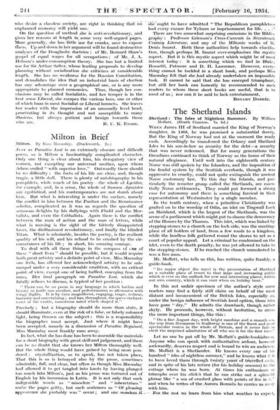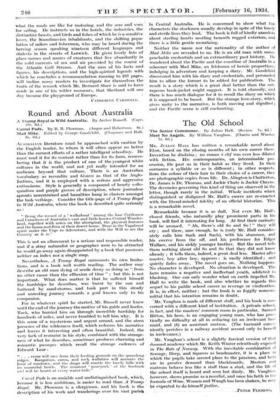The Shetland Islands
Shetland : The Isles of Nightless Summer. By William Moffatt. (Heath Cranton. 7s. 6d.) WHEN James III of Scotland married the King of Norway's daughter, in 1468, he was promised a substantial dowry.
But the King of Norway had not at the moment the ready cash. Accordingly Ile transferred the Orkney and Shetland Isles to his son-in-law as security for the debt—a security that was never redeemed. But for many generations 'the Orcadians continued to think of Norway as the home of their natural allegiance. Until well into the eighteenth century Norse was sill spoken by the Islanders, and the impasition of the feudal system 'by- the Scottish overlords, though it was oppressive to cruelty, could not quite extinguish the ancient Norse customary law. To this day the Islands, and par-
ticularly the remoter group called the Shetlands, are essen- tially Norse settlements. They could put forward a strong
case for autonomy and there is something farcical in their representation at Westminster by a single member.
In the tenth century, when a primitive Christianity was grafted on to the worship of Odin, an islet on Tingwall Loch on Mainland, which is the largest of the Shetlands, was the scene of a parliament which might put to shame the democracy of the Houses by the Thames. This islet, which was linked by stepping-stones to a church on the loch side, was the meeting- place of all holders of land, from a few roods to a kingdom, while the landless folk gathered round the shores to act as a court of popular appeal. Let a criminal be condemned on the islet, even to the death penalty, he was yet allowed to take to
the stepping-stones. If he reached the church unmolested he was a free man.
Mr. Moffatt, who tells us this, has written, quite frankly, a guide-book.
"Its major object (he says) is the presentation of Shetland as a suitable place of resort to that large and increasing publics which is ever on the outlook for new and interesting places, within our own country, which it can visit when on holiday bent."
In this not unfair specimen of the author's style some readers may find a fairly stiff claim on behalf of the most distant and inconvenient of the British Isles, especially as,
under the benign influence of Scottish local option, those isles have gone "dry." He admits the drawback, though rather
shyly. He proceeds, however, without hesitation, to stress the more important things, like this :
"On a fine August day, -with bright sunshine and a smooth sea, the trip from Stromness to Scalloway is one of the finest and most spectacular routes in the whole of Britain, and it never fails to elicit the surprised admiration vf all who see it for the first time."
Let no one be put off by Mr. Moffatt's guide-bookishness. 'Anyone who can speak -with authoritative ardour, however awkwardly, deserves respect and is bound to win an audience. Mr. Moffatt is a Shetlander. He knows every one ofhis hundred " isles of flightless stunmer,". and he knows *hat it is to have: loved the through tw6ri1y yeitti-Of tinyelIed exile, and in spite of his late return (for his holiday seasons) to the cottage where he was born. At times his enthusiasm so triumphs over his cliches that he can strike out a splendid phrase like "a Sea of crushed glass with -points of fire in it,"
and when he Writes of the-Aurora Borealis he carries us away with him. • ' ' " • ' •
-- -For-the _rest we learn from him- what weather to expect, what the roads are like for motoring, and the seas and Voes• ' for sailing. He instructs us in the hotels, the industries, the distinctive beasts, and birds and fishes of which he is a sensitive lover, the Scandinavian inhabitants, and the shifting popu- lation of sailors and fishermen, who may be heard during the herring season speaking nineteen different languages and dialects in the streets of Lerwick. He gives lovely lists of place-names and names of creatures that live abundantly in the mild currents of sea and air provided by the course of the Atlantic Gulf Stream. And the sum of his facts and. figures, his descriptions, and the high-spirited legends with which he concludes a recommendation running to 237 pages, will incline many readers to investigate for themselves the truth of the remark which Mr. Bernard Shaw is said to have made in one of his wilder moments, that Shetland will one day become the playground of Europe.
CATHERINE CARSWELL.









































 Previous page
Previous page